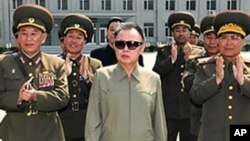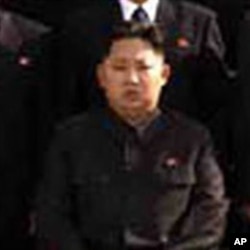North Korea watchers have gathered in Seoul to discuss the likelihood of various scenarios that could lead to a collapse of the reclusive state. Our correspondent reports on Thursday's international academic conference, where researchers debated the probability of a power struggle among North Korea’s elite.
Professors and think-tank researchers have come to the Asan Institute of Policy Studies for a conference themed “The Viability of the North Korean Regime.” The academics are airing results of their recent research at a time when Pyongyang is working to legitimize Kim Jong Un, the grandson of the country’s founder, Kim Il Sung.
Professor Liu Ming, a Korea specialist at the Shanghai Academy of Social Sciences, predicts the ruling Kim family in Pyongyang will try to re-establish a personality cult, similar to the one for his grandfather, to maintain power into a third generation.
“Many people [in North Korea], including the military people, doubt the legitimacy of the hereditary succession for three generations, particularly the qualification of Kim Jong-un," said Ming.
Although Kim Jong Il undisputedly sits at the top of the hierarchy, the power structure below him is more opaque. It is also considered more precarious because Mr. Kim must balance precious few resources between his military and the Worker’s Party.
Ron Wintrobe is an economist who studies dictatorships at the University of Western Ontario. He says this balancing act in the senior leadership could lead to a dangerous scenario, similar to Imperialist Japan, which overreached when it attacked Hawaii.
“When you have these dual authorities things can be really unstable, more so than with single ones," said Wintrobe. "Or in modern Iran, where you have again this dual authority with Ahmadinejad on the one hand and the mullahs on the other, again it's unstable and somebody can do something really crazy because nobody is really in charge.”
However, the Canadian professor does not foresee a catalyst for upheaval coming from the masses, as was the case recently in some Arab countries.
“Making your population poor, starving and miserable; those are not the kinds of people who revolt," he said.
Political science professor Han Byung-jin of the Keimyung University in Daegu, South Korea researches the possible breakdown of authoritarianism in North Korea.
He argues that ,if Pyongyang attempts gradual reforms similar to those initiated in other Communist states, it would lead to an abrupt collapse, not a hoped-for soft landing.
“I believe that, if any conflict occurred in North Korea, it is just spontaneous and happens in very decentralized and spontaneous manners," he said.
Others, such as Professor Wintrobe, believe there could be an eventual clash within North Korea’s military.
“The most common way for military regimes to collapse is with coups and counter-coups within the military," he said. "And so some dissatisfied group within that could possibly cause some rupture within the regime and then it could disintegrate. But this is all speculation.”
The uncertainty is because of a lack of credible and concrete information about the inner workings of North Korea. As Professor Liu notes, it is not as if he and his academic colleagues can send questionnaires to the leadership in Pyongyang.






